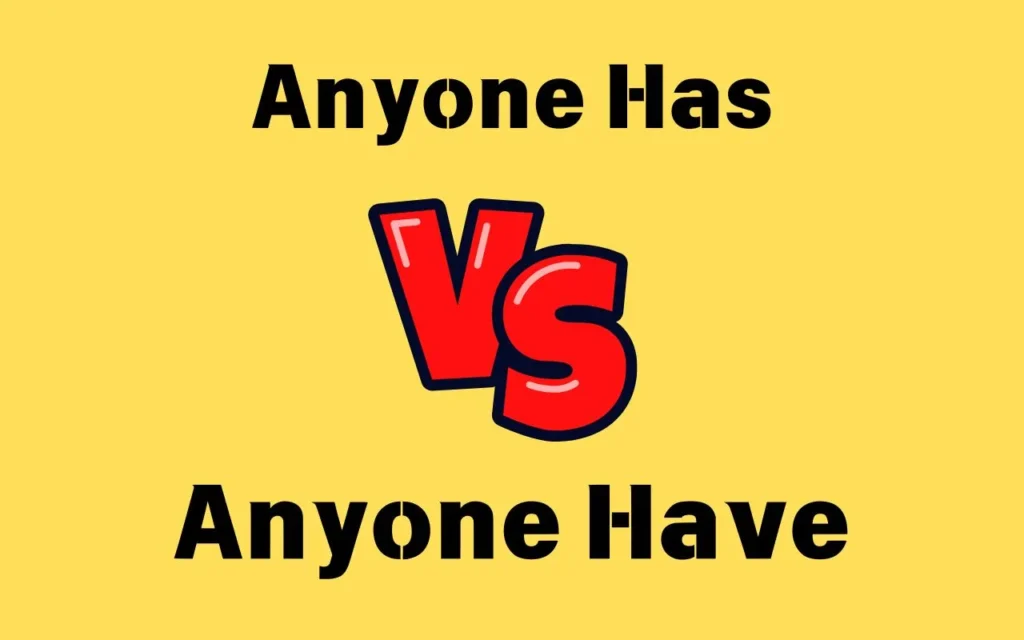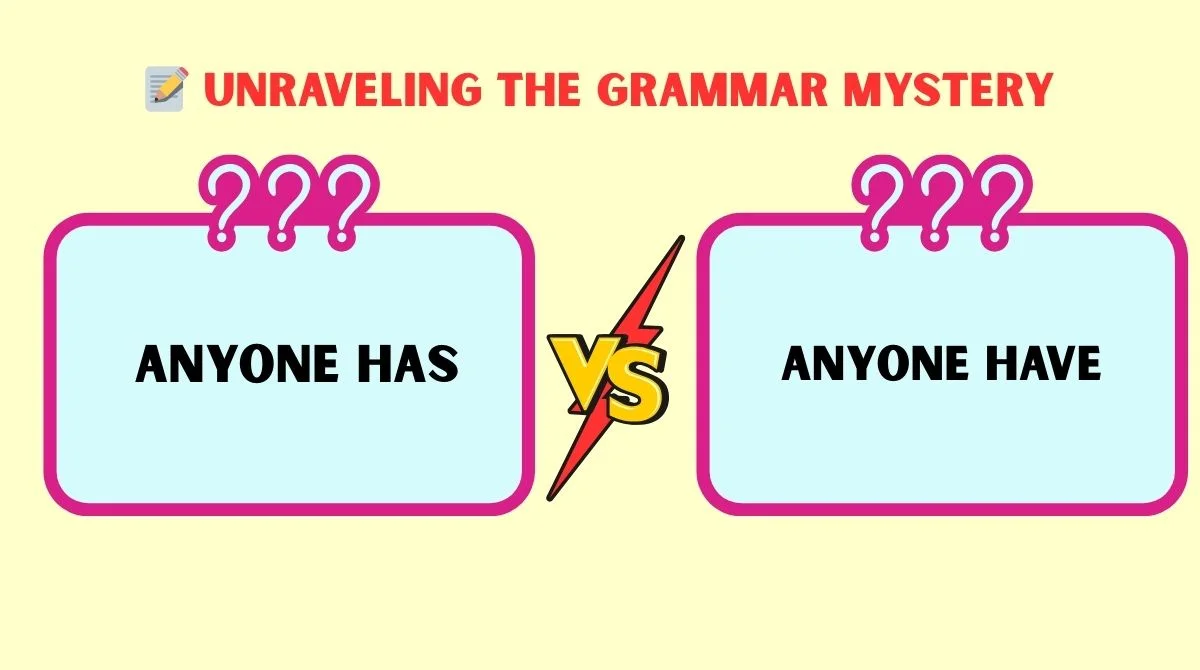Last updated on September 26th, 2025 at 01:44 pm
In English, small grammatical nuances can cause big confusion, especially when dealing with phrases like “anyone has” and “anyone have.”
Whether you’re writing a formal essay or having a casual conversation, knowing when to use the correct phrase is essential for clear and accurate communication.
This comprehensive guide will break down the rules, exceptions, and contexts where each phrase is used. By the end, you’ll feel confident navigating this tricky aspect of English grammar.
Understanding the Basics: ‘Anyone Has’ vs. ‘Anyone Have’

To understand the difference between “anyone has” and “anyone have,” let’s start with the basics:
- ‘Anyone’: This is an indefinite pronoun, referring to any one person out of a group. It is singular in grammatical structure.
Example: “Anyone is welcome to join the meeting.” - ‘Has’: This is the third-person singular form of the verb to have.
Example: “She has a question.” - ‘Have’: This is the base form of the verb to have. It is used with plural subjects or in specific constructions like questions and conditional clauses.
Example: “They have a lot of ideas.”
Quick Summary: “Anyone has” is used in declarative sentences, while “anyone have” appears in questions or conditional statements.
Is it “Anyone has” or “Anyone have”? In this detailed guide, we’ll explore the rules of subject-verb agreement and show you when to use each form, from questions to declarative statements. Learn the grammar nuances for clear, confident communication!
Grammatical Rules: When to Use ‘Anyone Has’
Declarative Sentences
In most declarative sentences, “anyone has” is the grammatically correct choice because anyone is a singular pronoun.
Examples:
- “If anyone has a question, please raise your hand.”
- “Does anyone here know if anyone has a copy of the report?”
Situational Contexts
Use “anyone has” when you are stating a fact or making a statement where anyone serves as the subject.
Tip: Remember, has follows singular pronouns like he, she, it, and anyone.
Conditional Clauses and Statements
Conditional sentences often create confusion with “anyone have” because the structure changes slightly.
Example of Correct Usage:
- “If anyone has any ideas, they should share them now.” (Declarative conditional statement)
However, in a question or an inverted structure, “anyone have” may appear.
Example in a Question:
- “Does anyone have a pen I can borrow?” (Here, the auxiliary verb does takes precedence, so have is correct.)
Formal Sentences and Correct Structures
In formal writing or speech, understanding subject-verb agreement is critical. “Anyone has” remains the correct choice in most structured, declarative sentences.
Examples in Formal Contexts:
- “If anyone has the qualifications for this role, please submit your application.”
- “It is important to verify whether anyone has completed the required training.”
Common Mistakes and Exceptions
Many people mistakenly use “anyone have” in declarative sentences, influenced by informal speech patterns or misunderstanding subject-verb agreement.
Common Mistake:
- “Anyone have questions before we start?” (Incorrect: Should be “Does anyone have questions?”)
Why the Mistake Happens:
- The influence of conversational shortcuts.
- Overlooking the role of auxiliary verbs in questions or negative statements.
Key Rule to Remember: Always check if an auxiliary verb (e.g., does) is present to determine the correct form of the verb.
Exploring the Use of ‘Anyone Have’
Although “anyone has” dominates declarative sentences, “anyone have” has its place in questions, conditional statements, and subjunctive constructions.
Questions
When forming questions, the auxiliary verb does changes the verb have back to its base form.
Examples:
- “Does anyone have a suggestion for the next meeting?”
- “Does anyone have the time?”
Subjunctive Mood
The subjunctive mood occasionally calls for “anyone have.”
Example:
- “If anyone have objections, let them speak now.” (Rarely used in modern English, but grammatically correct in older or formal contexts.)
Incremental Nuances in English Grammar
English grammar is filled with subtle nuances, and mastering them takes practice. The distinction between “anyone has” and “anyone have” highlights how verb forms change based on sentence structure, mood, and context.
Fun Fact: The subjunctive mood was more commonly used in older forms of English but has been largely replaced by indicative forms in modern usage.
The Role of Indefinite Pronouns
Why Is ‘Anyone’ Singular?
Indefinite pronouns like anyone, someone, and everyone refer to singular subjects, even though they imply a group.
Examples:
- “Everyone has their own opinion.” (Singular subject)
- “Does anyone have a different perspective?” (Still singular, despite the plural idea.)
Common Indefinite Pronouns
Here’s a quick list of singular indefinite pronouns to watch out for:
- Anyone
- Someone
- Everyone
- Nobody
- Each
Tip: Always pair these pronouns with singular verbs unless auxiliary verbs change the structure.
Subject-Verb Agreement with ‘Anyone’
The heart of this issue lies in subject-verb agreement. Since anyone is singular, it requires singular verbs like has in statements. However, in questions or negative sentences, the auxiliary verb dictates the verb form.
Examples for Clarity:
- Statement: “Anyone has the right to speak.”
- Question: “Does anyone have the right to speak?”
- Negative: “No one has the right to speak.”
Understanding Singular Versus Plural Contexts
Sometimes, the confusion arises because anyone implies a group, but it remains grammatically singular.
Singular Contexts:
- “If anyone has a key, we can open the door.”
Plural Contexts (Implied):
- “Does anyone have their keys?” (Here, the use of their accommodates gender-neutral language while keeping anyone singular.)
Practical Examples in Everyday Language
Here’s how these phrases appear in daily life:
| Context | Correct Usage |
|---|---|
| Asking for help | “Does anyone have a spare charger?” |
| Giving instructions | “If anyone has questions, ask now.” |
| Checking availability | “Anyone has a moment to discuss this?” |
| Error-prone usage | “Anyone have questions?” (Incorrect) |
Clarifying Common Confusions with Pronunciation Tips
Interestingly, the confusion between “has” and “have” can sometimes stem from regional accents or pronunciation habits. To avoid errors:
- Slow down your speech to pronounce each word clearly.
- Practice using both phrases in different contexts to reinforce the rules.
Additional Insights: ‘Anybody Have’ vs. ‘Anybody Has’
Like “anyone,” the indefinite pronoun “anybody” follows the same grammatical rules.
Correct Usage:
- “Anybody has the right to attend.” (Statement)
- “Does anybody have the right to attend?” (Question)
Key Takeaway: Treat anybody and anyone as interchangeable when it comes to subject-verb agreement.
FAQs
When do I use “Anyone has”?
“Anyone has” is used in declarative sentences where “anyone” is the singular subject, such as “If anyone has a question, please ask.”
When should I use “Anyone have”?
Use “Anyone have” in questions and conditional statements where the auxiliary verb “does” or “should” is present, e.g., “Does anyone have a pen?”
Is it correct to say “Anyone have a question”?
No, the correct form is “Does anyone have a question?” because it follows the subject-verb agreement rule in questions.
Why does “Anyone” take a singular verb like “has”?
“Anyone” is a singular indefinite pronoun, so it requires a singular verb like “has,” despite implying a group.
What’s the difference between “Anyone” and “Anybody”?
Both “anyone” and “anybody” follow the same grammatical rules. For example, “Anyone has a right to speak” and “Anybody has a right to speak” are both correct.
Why do people confuse “Anyone has” and “Anyone have”?
The confusion often arises from informal speech patterns or mistakes in subject-verb agreement, especially in casual settings.
Conclusion
Grasping the difference between “anyone has” and “anyone have” is all about understanding grammar rules, sentence structure, and context. Remember:
- Use “anyone has” in declarative sentences.
- Use “anyone have” in questions or conditional statements when paired with auxiliary verbs.
By practicing these rules and reviewing examples, you’ll avoid common mistakes and communicate with confidence. Have more grammar questions? Dive into the nuances of English with us to strengthen your skills!
